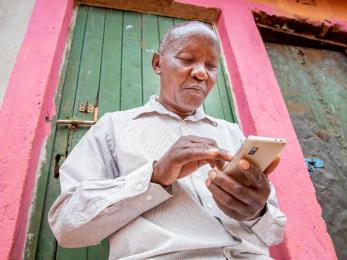Celebrating Mercy Corps Northwest and the entrepreneurial community

As the Executive Director of Mercy Corps Northwest, I’ve met hundreds of passionate small business owners across the Pacific Northwest. I’ve heard stories of determination that exemplify the entrepreneurial spirit—like that of Joe Nazir, who brought Egyptian-inspired coffee to Portland, Oregon.
In 2015, Joe opened Tōv Coffee shop inside of a double decker bus that delighted coffee lovers with his signature espresso drinks. He recently reached a milestone by moving his cafe into a brick and mortar space. “I'm trying to provide this place as a ‘third place,’ as they say, for this community and for the neighbors,” Joe said. I visited the new location and it was heartening to see how his business has grown—and Mercy Corps Northwest was a part of Joe’s journey as a small business owner.
Since 1998, Mercy Corps Northwest has had the privilege to serve communities across the Pacific Northwest with entrepreneurial support. The impact of this work has accumulated to $16.5 million dollars in grants and loans disbursed to entrepreneurs and over 130,000 hours of small business education. With more than 12,000 clients in Oregon and Washington having received services from Mercy Corps Northwest, it is bittersweet to announce our programming will conclude this year. We will transition our core business development services programs to other agencies to continue to support thriving entrepreneurial communities in the Pacific Northwest.

Clients like Joe, whose family had immigrated from Egypt, found Mercy Corps Northwest as a one-stop shop for early-stage small businesses, where he could attend business courses while receiving access to a substantial loan to open his cafe when many traditional banks were unable to support an emerging business. Businesses with five or fewer employees make up 86% of all Oregon and Washington enterprises. Small businesses are the backbone of our economy, yet owners face unique challenges and are routinely denied access to conventional lending due to a lack of operating history, credit, and collateral. Entrepreneurs from marginalized communities—like people of color, immigrants, and women—were historically excluded from opportunities and Mercy Corps Northwest aimed to provide inclusive outreach and access to funding and business education across the region.
I was able to create this business and employ so many artists and give them stable income.
Celese Willliams, Mercy Corps Northwest Client
Celese Williams was trying to find her path with her small business when she first participated in our matched savings business grant program in 2011. She also enrolled in the business foundations course, she realized there was a market for her artistic skill in face painting for events. In addition to learning the fundamentals of balancing her business account, she also gained experience in digital marketing which helped her to advertise her business, Mystique's Fancy Faces. One of the biggest lessons she learned was that she was undercharging for her services and has since gained confidence in requesting market rate for her unique talent.
It has been more than a decade since she began her business and she now employs 10 artists. “I was able to create this business and employ so many artists and give them stable income,” said Celese. “It's such a huge thing that I'm proud of.”
Celese has shared her insights and lessons learned with fellow women entrepreneurs through events presented by Oregon Women’s Business Center at Mercy Corps Northwest. The center served to elevate women and people of all gender identities with access to training, financial services, and coaching to assist them in starting and growing a business. Each year, more than 1,000 entrepreneurs received training and support to take the next step on their path to business success.
We also hosted one of Oregon’s most impactful prison entrepreneurship programs that reduced participant recidivism rates by nearly 50 percent. As part of the program, Mercy Corps Northwest trained incarcerated women at Coffee Creek Correctional Facility to develop an entrepreneurial mindset, leverage the potential of self-employment, and promote economic stability. Ninety percent of program graduates went on to secure employment or continue their post-secondary education within 30 days of their release from prison.

Through speaking with hundreds of entrepreneurs, I’ve heard over and over again that it can be a lonely venture of long hours, late nights, and uncertainty at times. I’ve also heard that Mercy Corps Northwest provided a community—a network of small business owners who were pursuing a similar dream. As this chapter concludes, we celebrate the unwavering dedication of the many people we’ve reached across Oregon and Washington who are investing in their own communities with their entrepreneurial spirit.


